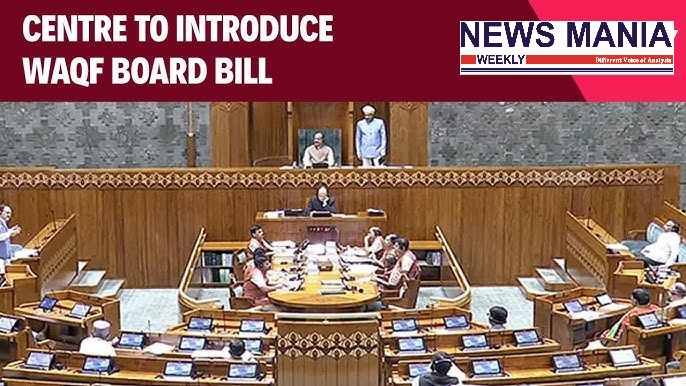Centre Introduces Waqf Bill Amid Controversy, Opposition Deems It Unconstitutional

News Mania Desk/Agnibeena Ghosh/8th August 2024
On Thursday, Union Minority Affairs Minister Kiren Rijiju introduced a significant bill in the Lok Sabha aimed at amending the laws governing Waqf boards. The proposed legislation has sparked intense debate, with the government asserting its need to regulate Waqf properties more effectively. However, the bill has been met with fierce opposition from several political leaders, who have labeled it “unconstitutional” and “draconian.”
The bill, once passed, is expected to grant the central government considerable control over the administration of Waqf properties, which are assets dedicated to religious or charitable purposes in Islamic law. The move has been sharply criticized by opposition parties, particularly the Congress, which sees the bill as a direct attack on the secular fabric of the nation.
Congress leader KC Venugopal was particularly vocal in his opposition, describing the bill as “draconian” and a “fundamental attack” on the Constitution of India. Venugopal expressed deep concern that the legislation could exacerbate religious tensions and foster division within communities. He argued that the bill’s provisions could lead to widespread disputes over mosque properties, especially those without clear deeds, and ultimately result in communal conflict.
“There is a dispute in each and every mosque where there is no deed. Your fundamental idea is to create conflict and anger between communities and make violence everywhere,” Venugopal stated in a scathing critique of the government’s intentions.
The timing of the bill’s introduction has also raised eyebrows, with Venugopal suggesting that the government’s push for the bill is politically motivated, particularly with upcoming Assembly elections in Maharashtra and Haryana. He implied that the ruling party is using the Waqf Bill as a tool to polarize voters ahead of these crucial elections, thereby influencing the electoral outcome in its favor.
While the government has not yet responded to these allegations, the introduction of the Waqf Bill has undoubtedly added another layer of complexity to the already charged political environment. The bill’s passage through Parliament is likely to be contentious, with the opposition promising to challenge it at every step.
The proposed changes to the Waqf Act have not been fully detailed in public yet, but the mere prospect of increased government oversight over religious properties has triggered alarm among various community leaders and activists. Critics argue that the bill could undermine the autonomy of Waqf boards and lead to greater governmental interference in religious affairs.
This development comes amid a broader national conversation about the role of religious institutions and the state, with many questioning whether the proposed legislation is in line with India’s constitutional principles of secularism and religious freedom. As the debate over the Waqf Bill unfolds, it is certain to remain a hotly debated issue in the political and public spheres.
As the story develops, more details about the bill’s specific provisions and potential impact on Waqf properties across India are expected to emerge. The outcome of this legislative push will likely have far-reaching consequences, not just for the administration of Waqf properties, but also for the broader discourse on religious rights and governance in India.






